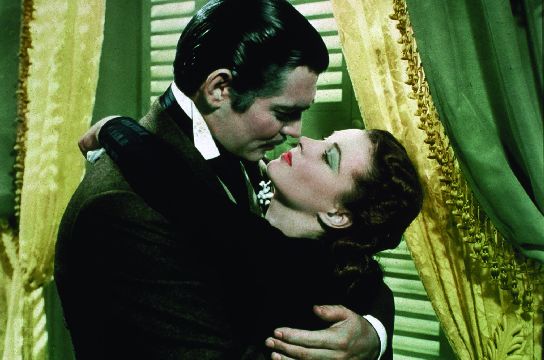Gone with the Wind (1939) 
“The greatest romance of all time!”

Gone with the Wind (1939)
Director: Victor Fleming
Cast: Clark Gable, Vivien Leigh, Thomas Mitchell
Synopsis: A manipulative Southern belle carries on a turbulent affair with a blockade runner during the American Civil War.
If Gone with the Wind had been made sometime in the last forty years, that famous final line would have been a guaranteed prelude to some misguided sequel designed to cash in on its success. Fortunately, back in 1939 the tendency to milk any success for all it is worth – even if to do so means devaluing the worth of that original success – was almost unheard of, and so the film stands alone, its memory unsullied by unworthy descendants. Having said that, Gone with the Wind enjoys its status as a classic thanks more to its grandiose scale than its quality. In this age of computer trickery we shall probably never again see a movie like this one. Its story is mired completely in the realm of the soap opera, but it’s filmmaking on a truly epic scale. Producer David O. Selznick lavished such care on all aspects of its production that we’re seduced into believing we’re watching something altogether more substantial than we really are.
Against the sweeping backdrop of the American Civil War and its aftermath, Gone with the Wind follows the fortunes of Scarlett O’Hara (Vivien Leigh – A Yank at Oxford, 21 Days Together), a spoiled, coquettish Southern Belle who finds that the qualities that make her so dislikeable in the opening scenes are the very ones that enable her to survive the hardships of the conflict when almost all about her perish or are irrevocably damaged. Clark Gable (Mogambo, A King and Four Queens) is Rhett Butler, one of those Southern Gentleman who hide their courage and devotion behind an air of roguish charm. Despite clearly being wrong for one another, he and Scarlett are kindred spirits whose lives are inescapably entwined, and we’re left with the clear impression that their apparently irreparable relationship isn’t over just because the film is.
British actress Vivien Leigh copes well with the demands of a role which calls upon her to carry much of the film, and is provided with typically self-assured support from Gable, who flits in and out of the picture much of the time, serving as a benchmark against which Scarlett’s growing maturity can be charted. She never loses that wilful streak, and thinks nothing of manipulating those around her, but by the end of the movie she’s a product of her experiences rather than simply a spoiled brat, and it’s impossible for the audience to dislike her despite her underhanded tactics.
The large supporting cast is led by Leslie Howard (49th Parallel), who is a little too bland as Ashley Wilkes, the object of Scarlett’s infatuation – leaving us to wonder why a spirited girl like Scarlett would be so taken with such a dullard – and Olivia De Havilland (The Heiress) as his wife Melanie, whom Scarlett eventually finds it impossible to hate. De Havilland brings all the professionalism you’d expect to a role which is largely thankless: Melanie is really a little too good to be true, unfailingly seeing the good in everyone. In fact, she and Ashley really are made for one another. Hattie McDaniel (Saratoga, The Great Lie) won a Best Supporting Actress for her performance as Mammy, the O’Hara’s faithful house servant, although her role would be seen as stereotypical today and puts one in mind of cartoon cat Tom’s loud-mouthed owner. In fact, those in search of some good old-fashioned racism to be offended by will be well-pleased with Gone with the Wind: Black people are repeatedly referred to as ‘darkies’ by their owners, and portrayed as slow and dull-witted or frightened dimwits – Butterfly McQueen (Duel in the Sun) as Mammy’s colleague Prissy is particularly irritating.
Gone with the Wind is one of those films which anyone who claims to be interested in movies needs to watch at least once. It’s a long film, but it flies by – which is always a good sign – and the fact that it’s still the American Civil War movie against which all other American Civil War movies are measured suggests that it possesses a quality that hasn’t been diminished by the passage of time.
(Reviewed 5th December 2014)
httpv://www.youtube.com/watch?v=0dTsfsr6-X8

